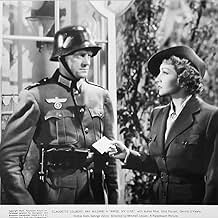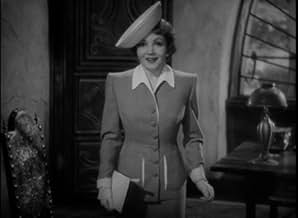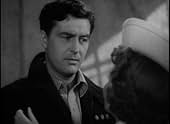AVALIAÇÃO DA IMDb
6,8/10
1,1 mil
SUA AVALIAÇÃO
Adicionar um enredo no seu idiomaA dashing pilot and a vivacious reporter have romantic and dramatic adventures in Europe as World War II begins.A dashing pilot and a vivacious reporter have romantic and dramatic adventures in Europe as World War II begins.A dashing pilot and a vivacious reporter have romantic and dramatic adventures in Europe as World War II begins.
- Direção
- Roteiristas
- Artistas
- Ganhou 1 Oscar
- 4 vitórias e 3 indicações no total
Rafael Alcayde
- French Correspondent
- (não creditado)
Rudolph Anders
- Prussian Officer
- (não creditado)
Carmen Bailey
- Woman at Maxim's
- (não creditado)
Charles Bastin
- Elevator Boy
- (não creditado)
Avaliações em destaque
10clanciai
Both Claudette Colbert and Ray Milland are superb in this brilliant war comedy drama in the shadow of the Spanish civil war and the Second World War. It was Claudette Colbert's own favourite among her films, and you'll understand some of its qualities better when you study the list of the script writers, one of whom was the young Billy Wilder. The dialog is brilliant all the way, there is any amount of eloquent scenes, and the romance gradually grows quite naturally with some skirmishes along the way. Walter Abel also gives one of his best performances as Claudette Colbert's employer, as he also gets his nose too far out into the business. Claudette Colbert is a journalist who goes to Spain to get out an American prisoner, who awaits his execution. That is Ray Milland, and the very first scene is perhaps the very best one, as Ray Milland sits in his cell waiting for his execution playing cards with a priest, while the firing squad is busy just outside, leaving one body just outside Ray Milland's window in a shadow that won't go away. Add to this the romantic music of Victor Young, which adorns many of the long romance scenes, while gradually the comedy transcends into a major war drama, with some curious coincidences on the way: on the train to Berlin, both Ray and Claudette being together on it, the emergency break is pulled just as the war breaks out, and when Ray and Claudette decide to leave all career thinking behind and go back to America to embark on a normal life, their ship gets torpedoed, and the war starts for real.
It's a delightful and innovative comedy all the way, eloquently mixed with some very serious business, and the film is so positive and edifying, that it would be worth returning to it every once in a while - it's the perfect emergency readiness film.
It's a delightful and innovative comedy all the way, eloquently mixed with some very serious business, and the film is so positive and edifying, that it would be worth returning to it every once in a while - it's the perfect emergency readiness film.
I am so mad at myself because I watched this in the 80's and 90's on American Movie Classics and like an idiot I didn't record it. Now I haven't seen it on any channel in years and it isn't available on VHS or DVD.
This is just such a breath of fresh air for a 1940 movie. It's a movie where the woman is as smart as the man and is allowed to show it and in the end stands tall with him instead of behind him. The dialogue is funny, which given the exceptional writers like Billy Wilder, is not surprising. Colbert and Milland have wonderful chemistry. It's a movie I adore from start to finish. Now if only Paramount would get off their arses and release this movie on DVD, I'd be thrilled.
This is just such a breath of fresh air for a 1940 movie. It's a movie where the woman is as smart as the man and is allowed to show it and in the end stands tall with him instead of behind him. The dialogue is funny, which given the exceptional writers like Billy Wilder, is not surprising. Colbert and Milland have wonderful chemistry. It's a movie I adore from start to finish. Now if only Paramount would get off their arses and release this movie on DVD, I'd be thrilled.
In the final analysis, a film is about cinematography. From the very beginning at the Spanish prison, extraordinary cinematography is used to an exceptional degree, and it continues through the film. There are minor exceptions, as with the file film of airplanes flying. More importantly, the film claims the obvious: The Spanish government in 1939 had more than casual leanings toward Berlin. The bombing of Guernica by the Nazi air force is testimony, here reinforced. Tom Martin (Ray Millard) says he had a pet rat in his jail cell named "Adolph." Spain's neutrality during World War Two is in question with Paramount Pictures, as it was in diplomatic circles. Of course, a 1940 movie about event of 1939 has the advantage of historical retrospect, yet the public actions of the Spanish government stand. Claudette Colbert as Agusta Nash is the career woman whose career comes before love, who puts her career before all. Her assignment as Special Berlin Correspondent is to tell of Hitler and his gang. A series of unpredictable events leads her to redefine her sense of patriotism. There are, in effect, many loves which must arise and spite the envious moon. Cinematography, historical theme, and some darn good acting all unite for an effective historical perspective on life at the beginnings of World War Two.
10SaraX626
Definitely in my all time top 10. The Milland/Colbert pairing is fantastic, there is wonderful chemistry between the two stars but it is Colbert who as the independent career woman Augusta Nash launched me on my love of 1930's/1940's films and I would recommend this as a fabulous example of what films of that era have to offer a modern audience.
The opening sequences set the adventurous and romantic tone of the movie. The scenes in Maxim's and the in the horse drawn carriage on Monmartre are wonderfully romantic as Tom (Milland) plots to overcome Augusta's business only attitude. A fabulous film which gets home the patriotic message needed as WWII commenced without ever overwhelming the wonderful adventurous story.
The opening sequences set the adventurous and romantic tone of the movie. The scenes in Maxim's and the in the horse drawn carriage on Monmartre are wonderfully romantic as Tom (Milland) plots to overcome Augusta's business only attitude. A fabulous film which gets home the patriotic message needed as WWII commenced without ever overwhelming the wonderful adventurous story.
Mitchell Leisen was one of the few directors who could introduce tragedy into comedy and vice versa .The first part is absolutely dazzling.Incredible though it may seem ,it's full of unexpected twists,of fine lines ("it's my first execution" says the Padre /It's mine too" says the prisoner).The chemistry between Claudette Colbert and Ray Milland is perfect and their husband-and-wife act compares favorably with that of the actress as a "baroness ,her husband and her children" in "midnight" .The movie loses steam in its second part but it does show Mitchell's fondness for France .Unlike too many American movies,there are plenty of French words and the French speak French between them.I particularly like this sentence "Three sisters used to live in this country :Liberté ,Egalité Et Fraternité " as the German army is marching past the streets of Paris.This francophilia is also present in Leisen's "hold back the dawn" or "Frenchman's creek" .
The last third may be considered a propaganda one ,but many other directors (Hitchcock,Lang,Hathaway,Borzage etc) had theirs too,and Leisen's is certainly smarter than most of the others.Solomon's prayer (which provides the title) is to be taken literally.Augusta is a go-getter ,she plays the heroine just for the sake of fame .After the beautiful scene in the forest ,where the animals run for their lives ,she does arise .The scene in the Compiègne Car is as incredible as Marlene Dietrich as a gypsy entering an inn full of Nazis in "golden earrings" .But the Spanish extravagant tale had warned us:this is not to be taken seriously ,but in a way,it is.
The last third may be considered a propaganda one ,but many other directors (Hitchcock,Lang,Hathaway,Borzage etc) had theirs too,and Leisen's is certainly smarter than most of the others.Solomon's prayer (which provides the title) is to be taken literally.Augusta is a go-getter ,she plays the heroine just for the sake of fame .After the beautiful scene in the forest ,where the animals run for their lives ,she does arise .The scene in the Compiègne Car is as incredible as Marlene Dietrich as a gypsy entering an inn full of Nazis in "golden earrings" .But the Spanish extravagant tale had warned us:this is not to be taken seriously ,but in a way,it is.
Você sabia?
- CuriosidadesClaudette Colbert once said that this was the favorite of all of her films.
- Erros de gravaçãoWhen Walter Abel tells Claudette Colbert that she has got a new assignment in Berlin and she is told she is going in 3 days time on Saturday, she receives a cable dated September 1st, 1939, from Ray Milland. September 1st, 1939, was a Friday.
- Citações
Mr. Phillips: Gusto Nash, you're fired, as of immediately!
Augusta Nash: Oh, it's not true!
Mr. Phillips: I know it's not true. I just wanted to taste the words. Sheer rapture!
- ConexõesFeatured in Hollywood contra Franco (2008)
- Trilhas sonorasDream Lover
(1929) (uncredited)
Written by Victor Schertzinger
Lyrics by Clifford Grey
Sung and hummed by Claudette Colbert
Introduced in Alvorada do Amor (1929)
Principais escolhas
Faça login para avaliar e ver a lista de recomendações personalizadas
- How long is Arise, My Love?Fornecido pela Alexa
Detalhes
- Data de lançamento
- País de origem
- Idiomas
- Também conhecido como
- Arise, My Love
- Locações de filme
- Empresa de produção
- Consulte mais créditos da empresa na IMDbPro
- Tempo de duração1 hora 50 minutos
- Cor
- Proporção
- 1.37 : 1
Contribua para esta página
Sugerir uma alteração ou adicionar conteúdo ausente

Principal brecha
By what name was Levanta-te, Meu Amor! (1940) officially released in India in English?
Responda

































